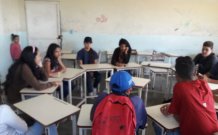Articles

The young people described problems in their daily life
Young Venezuelans distrust all politicians and mourn lost childhood, study shows
Young Venezuelans distrust politicians of all parties and are doubtful anyone can improve their daily lives or give them more opportunities, a new study shows.
Disillusionment with whoever is in charge will be the biggest challenge if the country transitions to a different political system, the research suggests.
Most young people who took part in the study were suffering from psychological trauma caused by family breakdowns due to relatives moving out of the country, prolonged isolation and the sense of having been deprived of a childhood.
The young people described problems in their daily life, such as getting enough food or being able to socialise, and economic issues.
The research involved focus groups carried out with 78 young people aged between 15 and 28 from different backgrounds across Caracas in August and September 2019, as part of the project ‘Pensamiento y libertad’,
Some were still in school or university, while others could no longer afford to continue in education. The 33 women and 45 men discussed their daily lives, their relationships with their families and communities, how conflict affects them, whether they feel free, and what they think their role can be in overcoming conflict.
Dr Katie Brown, a specialist in Venezuelan culture at the University of Exeter who led the project, said: “We have found overcoming conflict in Venezuela will take much more than a change of government. Young people, born and raised during twenty years of chavista rule, present a key challenge for the success of any transition plan.”
‘Pensamiento y libertad’, or Thought and Freedom, which began in summer 2019, is a collaboration between Dr Brown, social scientists Dr Mirla Pérez, Dr Jésus Flores and Alexander Campos from the Centro de Investigaciones Populares in Venezuela, and the Caracas-based theatre school Escuela de Teatro Musical de Petare. The project aims to show the impact of the political conflict on the everyday lives of young people in Caracas.
The experts will build on these findings to run creative workshops in which young people can develop and express their ideas about freedom, peace, and overcoming conflict. The project is part of Changing the Story, funded by the Arts and Humanities Research Council via the Global Challenges Research Fund, which asks how the arts, heritage, and human rights education can support youth-centred approaches to civil society building in post-conflict settings across the world.
Most participants in the focus groups showed little knowledge of different political systems. Those who could give a definition of democracy did so with reference to stories from their parents and, especially, grandparents.
Dr Brown said: “People involved in the research were aware the situation in which they live is not normal and they hoped for change. They were committed to their country, and wanted to study and make a life there. They wanted to give their family a better life.
“Any transition will need to channel this commitment, while rebuilding trust by showing citizens they are listened to, and improving their daily lives. Young people must have a voice in this process, which requires both a robust political education, and programmes to develop their critical thinking, communication skills, and confidence.”
Words used frequently by those in the focus groups, especially those with the fewest opportunities, were: frustration, fear, suffering, sadness, anger, boredom, overwhelmed. Participants spent a large amount of time alone or with their immediate family, except for those still able to go to school or university.
Those with jobs were grateful to be in work, but frustrated their wages only covered immediate needs such as food, water and electricity. They were unable to plan for a future and much of their day was wasted on tasks such as queuing for food or waiting for a water delivery.
One participant put it, ‘You take a gamble on surviving, because if you get sick that can be your path to heaven… Here I’m literally on the edge between surviving or not’.
People said they were grieving because they didn’t have the same experiences as their parents and grandparents to socialise or feel safe in the streets. They felt like they were ‘having to grow up too fast’ and missing out on a childhood.
Almost all of the participants had been affected by at least one family member emigrating and said this was one of the worst consequences of the conflict, especially seeing other family members, particularly grandparents, suffer from the separation.
Date: 3 June 2020
